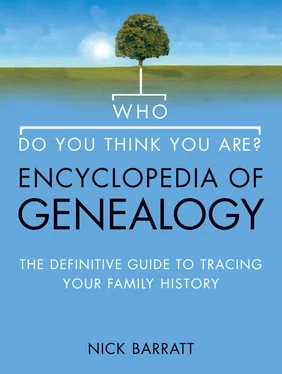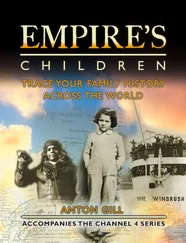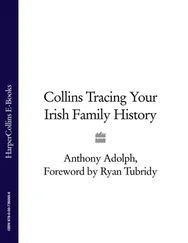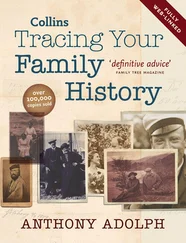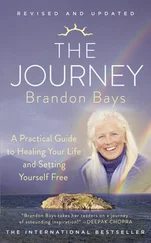DO YOU THINK YOU ARE? ™
ENCYCLOPEDIA OF
GENEALOGY
THE DEFINITIVE GUIDE TO TRACING
YOUR FAMILY HISTORY
NICK BARRATT

Dedication
Cover
Title Page
Dedication
Introduction
How to Use This Book
Section One: Getting Started
1: First Steps
2: Building Your Family Tree
3: Working in Archives
4: Research Tips and Hints
Section Two: Basic Sources
5: Civil Registration
6: Census Returns
7: Parish Records
8: Wills and Probate Documents
Section Three: Areas of Family History
9: Military Ancestors: The British Army
10: Military Ancestors: The Royal Navy
11: Military Ancestors: The Royal Marines
12: Military Ancestors: The Royal Air Force
13: Occupations: The Merchant Navy
14: Occupations: The Sea
15: Occupations: Mining
16: Occupations: Factories, Foundries and Mills
17: Occupations: Travel and Communications
18: Occupations: Farming and Agricultural Labourers
19: Occupations: Professional Classes – Private Sector
20: Occupations: Professional Classes – Public Sector
21: Occupations: Trades and Crafts
22: Migration: Immigration
23: Migration: Emigration
24: Family Secrets: Poverty and Lunacy
25: Family Secrets: Illegitimacy and Adoption
26: Family Secrets: Bigamy and Divorce
27: Family Secrets: Criminal Ancestors
28: Social History: Working Further Back in Time
Section Four: Troubleshooting Guides
Chart 1: Army Service Records, First World War
Chart 2: Army Service Medals, First World War
Chart 3: Early Army Service Records
Chart 4: Naval Service Records
Chart 5: Merchant Seamen Service Records
Chart 6: Royal Marine Service Records
Chart 7: RAF Service Records
Chart 8: Immigration
Chart 9: Emigration
Section Five: Key Resources
Origins and Meanings of Popular Surnames
Definitions of Historic Occupations
Genetic Genealogy
National Archive Profiles
Useful Website Addresses
Index
Acknowledgements
About the Author
Copyright
About the Publisher
Congratulations. By picking up this book, you have just taken your first step on a unique journey into your past, one that will gradually reveal lost generations of your family that you never knew existed; their place in history; and the path that has led you to stand here today, reading this. Thousands of others have started a similar voyage of discovery in recent years, each on a personal mission to reveal who their ancestors were, and what their lives were like.
One of the driving forces behind this phenomenon is the hit BBC TV show Who Do You Think You Are? , where every week a celebrity investigates their ancestral roots. Essentially a social history of Britain and its wider role in the world, the programme has stimulated millions of people to challenge their memories from school that history was a dull, academic subject and explore the past from a fresh perspective – that of their own relatives, rather than the politicians, generals and royals that tend to populate our textbooks. As a result, history becomes real, living and relevant; it’s a personal journey into the past, with your own relatives as the tour guides. Events that you might once have read about in a textbook suddenly take on a new meaning once you realize that your ancestors were there as eye witnesses or even participants. The most exciting thing of all is that everyone can trace their family tree – it’s not the exclusive preserve of those with privileged blood lines or aristocratic roots, but something that each and every one of us can do.
So why start looking into your family’s history? Traditionally the press have given genealogy a rather negative image. Indeed, one commentator was moved to write that family history was ‘self-indulgent navel gazing’. What utter nonsense! There are so many reasons why it is important to look into your family’s background, leaving aside the sheer joy of discovery that makes it such an addictive pastime. Perhaps the most important reason for starting is that you are going to discover more about yourself and your family, and gain a real understanding about where you have come from, who the main people were that shaped the fortunes of your family, and how small decisions in the past have had a knock-on effect over the years. In essence, every one of us is the living embodiment of the strands of personal history woven by our ancestors, all of whom contributed in some way to making us who we are today. In turn, their struggles to survive in a variety of changing conditions allow us to gaze into wider British social history, and ask questions about how we fit in. What was our class or cultural background? How did we fare in some of the great social upheavals in the past, such as the Industrial Revolution? Each generation faced a new challenge, and you can revisit these moments in time through your investigations.
‘ Every one of us is the living embodiment of the strands of personal history woven by our ancestors .’
There is another important reason to set out on this voyage of discovery, namely to preserve these links with the past, which – once broken – are very difficult to repair. This is why, as you will see, you should always talk to your elderly relatives and record their stories, anecdotes and knowledge. It is a sad fact of life that we often take an interest in our past when it is no longer possible to talk to those who played such an important part in shaping it. Yet it is not just about preserving the past; by looking into your family’s background, you will be creating a legacy that can be passed on to future generations – children, grandchildren and those still to come. This is especially important in the digital age, when we are no longer creating the treasured artefacts that we now look for and preserve as keepsakes from years gone by – photographs, letters and postcards. Our means of communication – email, text, mobile phone – are instantly disposable unless we take active steps to preserve them, so it is just as important to record our thoughts and feelings now, or future generations won’t have the material to hand to understand us, or the people that made us who we are.
However, there are several myths about family history that you might have heard, and these need to be explained briefly. One misconception is that it is all about building a family tree as far back as possible. Whilst it is important to name ancestors and place them in history, the family tree is simply a map of your roots, showing you how your ancestors are related to one another. The real purpose of family history is to bring these names back to life by researching where they lived, what jobs they did, how their community changed over time, and the ways in which their lives were touched by local and national events. In many ways, the phrase ‘family history’ has rather outlived its use; instead, we should be thinking of ‘personal heritage’, as you’ll be creating a far richer, brighter and more interesting picture of your ancestors than a list of names on a page.
The second myth that needs dispelling is that family history can be done quickly via the Internet, and that all you have to do to track down your distant ancestors is log on, subscribe to a few websites, and you’ll have a family tree ready within hours. Sadly, this is completely untrue and misses the entire point of starting in the first place! As you will discover, there are certainly plenty of websites that will help you get started – and the datasets and databases that they contain continue to grow almost daily – and you will be able to achieve an amazing amount before you have to consider heading into an archive or museum. By putting the basic sources online, such as indexes to birth, marriage and death records, census returns and some wills, the process of constructing an initial family tree has been revolutionized. However, the Internet only provides a fraction of the resources you’ll need to flesh out the bones of your family tree and – as indicated above – bring your ancestors to life as real people who faced real challenges. This is where this book takes over, and leads you into the world of Britain’s archives, where there are original documents – often dating back centuries – that contain details of your ancestors’ lives, or were even written by them.
Читать дальше
